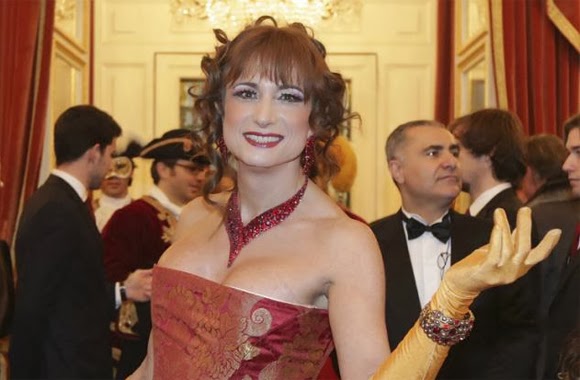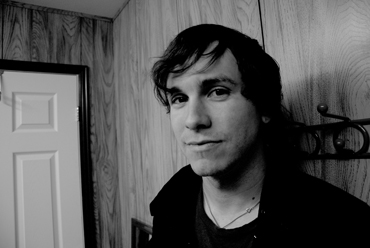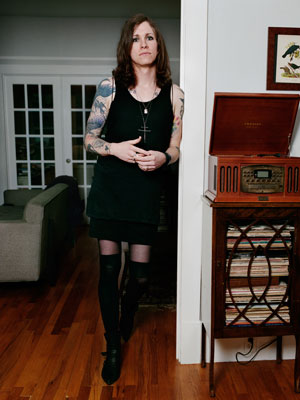My First Year as a Woman
Last year, punk rocker Tom Gabel astonished his fans and the
music industry alike by announcing he was becoming a woman and changing
his famous name to Laura Jane Grace. Here, an exclusive account of a remarkable journey.
Edited by Marina Khidekel
At age 5, Tommy Gabel happened to catch a Madonna concert on TV.
That's me! he thought to himself, entranced.
That's who I'll be when I grow up.
Lots of little girls want to become Madonna—the problem was, Tommy felt
like he was a girl even though he had a boy's body. Seeing Mia Farrow
with her
Rosemary's Baby–era pixie cut, which looked like his own boy haircut, inspired him: "She was my hero."
Soon, Tommy started nosing around his mom's closet. He would build
forts out of pillows and sneak in a pair of his mom's nylons. In middle
school, he started shoplifting girls' clothes. "Putting them on made me
feel calmer, more like myself. It was a stress relief," says Tommy—now
Laura. Growing up in Florida in the pre-internet '80s and '90s, Tommy
had no examples of people experiencing what he was. "We had
Silence of the Lambs and
Ace Ventura.
Society doesn't portray transsexual people in a very positive light.
Every example I saw—mostly transvestites, and I didn't know the
difference—reinforced the shame I felt." (One is a term for some one who
likes to cross-dress. The other is a complicated reality for more than
700,000 people in America.)
One day, 13-year-old Tommy found an encyclopedia entry about Renée
Richards, a transgender tennis pro in the '70s who was born a man but
underwent sex-reassignment surgery to live as a woman. A light came on.
"It was the tiniest entry, but I read it and reread it. Any time I found
any information about some one like me, I devoured it." At 8, Tommy
started taking comfort in music, learning guitar, and in high school, he
discovered punk bands like Sex Pistols and The Clash. "Kids would call
me faggot and beat me up. I liked that punk was about fighting back, as
opposed to just taking it.
"
In high school, Tommy dated girls. "I was always attracted to women.
It was never a sexuality issue. I just knew that if I could make a wish
to change into a woman myself, I would have made it 100 times every day.
It became so stressful that I'd reach these points where I'd throw all
my women's clothes in a dumpster and swear, 'Never again will I do
this!'" Tommy left high school early to perform with his band, Against
Me!, and began a punishing tour schedule—9 or 10 months out of the year.
But the music couldn't drown out the feelings, and he planted clues
deep in the band's song lyrics: "If I could have chosen, I would have
been born a woman / My mother once told me she would have named me Laura
/ I would grow up to be strong and beautiful like her."
Then Tommy met and fell in love with Heather Hannoura—an artist and
band-merchandise designer (they would later marry and have a
daughter)—and fully committed to living as a man. The stress of a
disillusioning experience with a major record label and Heather's
pregnancy sent Tommy into a tailspin of alcohol and drug abuse. "I was
numb. I couldn't write; I couldn't function. The feelings were totally
consuming. I couldn't live the lie anymore." Two years went by in a blur
of secret research and reading blogs written by trans women. Things
finally became clear. At 31, he decided to say good-bye to Tommy Gabel
and live as Laura Jane Grace, thinking,
I can do this. I'm going to do this.
Making My Confession
"Can we talk?" I asked my wife, Heather, on February 6, 2012, three days
before her birthday. Maybe this wasn't the best timing, but I couldn't
wait any longer. The pressure that had built up inside me for 31 years
was about to burst. We lay down on our bed, Evelyn, our 3-year-old,
napping in the other room, and looking into my wife's beautiful brown
eyes, I made my confession: "I'm a transsexual." I buried my head into
her chest and explained that this was something I'd been struggling with
all my life. I wasn't sure how Heather would take it. She said
something like "That's all you were going to tell me?" She later told me
she thought I was going to say I had cheated on her or wanted a
divorce—which she said would have been worse for her. She told me at
that moment—and kept telling me—that she wasn't going anywhere. The day
after I told Heather, I shared the news with my band—they were stunned
but really supportive. I hadn't intended to tell them. Sitting in our
studio, the words just came out of my mouth. Momentum carried me.
Going Into Therapy
The closest psychotherapist I was able to find who specialized in gender
was in Gainesville, Florida, an 80-mile drive from my home in Saint
Augustine. I didn't want someone to tell me what to do. I knew what I
needed to do, and on the drive to my first appointment, I worried about a
therapist getting in my head and unraveling whatever it is that gives
me the ability to write songs. What I really wanted was a letter telling
an endocrinologist that I was mentally stable enough to start
hormone-replacement therapy (HRT), and I knew that would take time to
get. But during the one- to two-hour sessions I attended at least once a
month, just saying "I want to transition" out loud gave me confidence
and made me feel less crazy. Five months later, I got my letter.
"Are you sure that this is what you want to do?" the endocrinologist
asked at our brief meeting. "Yes," I said. And with that, I was written a
prescription for low doses of estrogen, progesterone, and
Spironolactone and told to make an appointment for three months down the
road. As I was paying, the receptionist kept referring to me as "sir"
(at other doctors' offices, I'd gotten smirks and odd glances). I felt
upset, but leaving the office, I realized that this is the way it will
be. If I want someone to recognize the gender identity I feel, I'd have
to ask for that. I can't assume people will know how I'd like to be
treated on their own.
Starting Hormones
Holding those three little pills in my hand for the first time on May
11, 2012, was a turning point. I'd spent many sleepless nights leading
up to that moment, thinking over exactly what I had decided to do. What
if I wanted to stop? Was there a point of no return? At first, it was
hard to tell whether the differences I felt were from the actual
hormones or from the excitement about my change…but slowly, I started to
feel more like myself, emotionally and physically. The hormones
softened my skin, made my hair grow faster, and redistributed some of my
body fat—my arms slimmed down and weight moved from my chest to my
hips. And yes, I'm starting to develop breasts (I'm pretty sore at the
moment). The HRT won't change my voice though—only surgery can do
that—but I like my singing voice, so I don't really care about that.
Telling My Daughter That I Will Always Be Her Daddy
I've used rock-and-roll history as a reference for Evelyn. Every
morning, we watch music videos or look at record covers. The New York
Dolls, Boy George, David Bowie, Freddie Mercury—Evelyn has seen many
rockers blurring gender lines and has taken amazingly well to referring
to me as "she" and "her." Still, I could tell she was a little confused
the first time she saw me presenting as a female. One night, a couple of
weeks into transitioning, as I was putting her to bed, she said she
didn't want me to be a girl anymore—she wanted me to be a boy again. I
had never felt more self-doubt in my decision than at that moment. The
only thing I could do was to assure her that no matter what happens, I
will always be her daddy and I will always love her.
Yes, Evelyn still calls me Daddy, and she can for as long as she wants.
At some point, she may want to adopt another name to call me—we may find
ourselves in situations where people could get confused. If, say, both
of us are in a public women's restroom and she's referring to me as
Daddy, it may cause unwanted attention. I worry about what will happen
when Evelyn starts school. I worry that other kids might make fun of her
on account of my being trans. Truth be told though, when it comes to
what other people think about me, I say fuck 'em. That's the lesson that
I want to impart to my daughter: It doesn't matter what people think of
you—you have to be true to yourself.
The Personal Stuff
I mean it when I say that I believe my wife is my soul mate and that we
were destined to be together. I'll never love anyone more.
I've always loved sex with my wife, and I want that to continue. Other
than my fears about how my transition will affect my daughter, my
greatest fears involve how this will affect intimacy with my wife.
Eventually, HRT will cause me to lose the ability to get an erection,
and at some point, I want to have full sex-reassignment surgery, which
entails removing the male genitalia and creating a vagina and clitoris.
When my body changes, will Heather still find me attractive? Will she
still want to have sex with me? How will I continue to have sex with my
wife if I can't get hard? I've thought through this question over and
over. The answer, simply put, is the way any other lesbian couple would.
We'll just have to figure out what feels good. Our relationship will
face challenges, and some of those challenges will just be more fun to
take on than others.
My Ally, Joan Jett
One of the first people I received a letter of support from after coming
out was Joan Jett, who I knew a little from doing the Warped Tour
together in 2006. Joan is a hero of mine and a rock-and-roll pioneer.
When she started out, the rock scene was predominantly male. She defied
gender stereotypes all on her own. My daughter, Evelyn, is also a huge
Joan Jett fan. She asks for Joan's records to be played and adores her
Joan Jett Barbie doll. Against Me! went through New York City on tour
with The Cult in June, and I asked Joan if she'd sing a song with us.
She and her band had covered The Replacements' "Androgynous" onstage,
and The Replacements are one of my all-time favorite bands. Joan was
into the idea! Singing together onstage, I felt so confident and
grateful for her support. Back on the tour bus after the show, I
watched, astonished, as Joan Jett leaned down and tucked an excited
Evelyn, who was supposed to be asleep, into bed.
My First Year as a Woman
My First Miniskirt
Deciding to wear a skirt onstage in September was a personal landmark.
It was the first time I had ever worn a skirt in public—and I would be
doing so in front of a couple of thousand people. The skirt was a gift
from a friend—it was black and leather, and it fit me great. I was
worried about playing in it, unsure if it would affect the way I moved.
Our set that night wasn't our best, but it didn't matter. I was breaking
new ground. Accomplishing small goals when transitioning has a
cumulative effect. The confidence you gain from reaching one carries you
to the next. Face your fears, I say, but choose the right skirt to do
it in.
Christmas
The Christmas before last was miserable—I was burnt out and spent the
day drinking. This year's was a world apart. We were at home, just the
three of us, our small family. Evelyn came bounding into our bedroom
early. "Santa came!" she yelled. Together, we sat around the tree and
opened presents. I laughed when I found a matching bra-and-panties set
in one box, a gift from Heather. A definite first.
My Fans
During our shows this year, I was surprised by how many fans stuck by my
band and how many came up to offer their support afterward. I met trans
men and women from all walks of life, all at various points in their
journeys. Many said I was an inspiration to them, but
they are
an inspiration to me. I had questions about transitioning, and my new
friends were more than happy to share their tips! I don't know a single
other person who is trans where I live. But now I feel lucky to have
friends around the world who share in the experience. Growing up, I
never had a role model to show me that you can be trans and live a happy
life. I hope that I can be that source of hope for someone out there
who's struggling.
Laura's Photo Diary

By January 2012, Laura had decided to transition into living as a woman
and started a photo diary of her metamorphosis. Her first physical step
was to get her facial hair removed with laser treatments, then she began
hormone-replacement therapy, which has led to faster hair growth,
softer skin, redistributed body fat, and breast development. The changes
have "made me feel more like myself," says Laura.
Heather, Laura's wife, tells her side of the story.

Gillian Laub
Heather's Side of the Story
Laura's wife, 36, opens up about the changes in their lives.
Cosmo: Did you ever suspect that Laura, then Tommy, had gender issues?
Heather: There was never anything that made me think
that Laura was unsatisfied with living as a man. I'd previously dated
guys who were much more effeminate!
Cosmo: When Laura revealed her secret, what went through your mind?
Heather: It broke my heart to know she'd been going
through this on her own for so long. I wasn't mad, because I can't
fathom how hard it was for her to tell me after having been married for
six years. I know other couples split up over this, but I never
considered leaving. I did fear, at first, that the thing that would make
her feel most like a woman would be being with a man. But she said,
"Just think of me as a lesbian!" After that, lots of things started to
make sense.
Cosmo: What kind of things?
Heather: Laura used to cover her journal with her hand
when writing, and it drove me nuts. I never snuck a peek, but once she
came out, it made sense—she'd been hiding a big secret! And when I was
pregnant, Laura would say she hoped for a girl because she didn't know
how to be a father to a boy. I couldn't wrap my head around why
fathering a son would unravel her…until she came out.
Cosmo: You married a man, but now you're with a woman. What's that like?
Heather: In my mind, I married a person with whom I
fell deeply in love. Laura's coming out has made me realize, in regard
to my own sexuality and ideas about gender, that it's all more fluid
than how society presents it. I'd always thought I was just straight.
But now I know that really the right girl hadn't come along yet. It's
exciting to know that I am still evolving.































